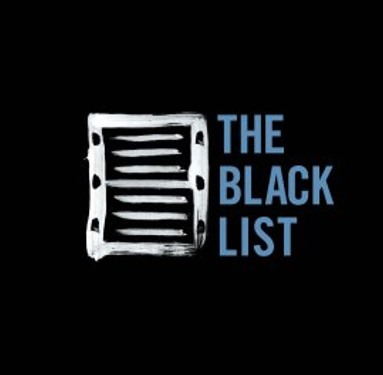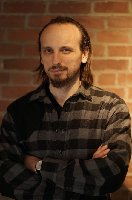What kind of products / services does your company develop / maintain? (web based, mobile, desktop, on-site appliance, embedded, hardware, etc.)
Web based.
Number of engineers:
Total team size is 8 with 2 full stack engineers. We also have hundreds of freelance professional readers who evaluate screenplays using our proprietary routing and queuing technology.
Are there any remote engineers? (If yes, how does that work out?)
All of engineering work is conducted remotely. We find remote work to be efficient and cost effective. Tools such as Slack and [Github](https://github.com/) are obviously crucial to being able to collaborate and get work done.
Are the remote developers in the same time zone? Do you have all your communication asynchronous or do you have on-line meetings? How? How often?
Team is geographically dispersed between California, Massachusetts and Vermont.
Developers are on same time zone on the east coast.
We do both scheduled online meetings (once per week) and some asynchronous communication via email / Slack throughout the week.
What are the most common tools that engineers use?
Our team uses a combination of engineering and communication tools:
- [Vim](https://www.vim.org/) for development
- [AWS CLI](https://aws.amazon.com/cli/)
- [Airbrake](https://airbrake.io/) for error monitoring
- [BrowserStack](https://www.browserstack.com/) for test automation
- [Castle.io](https://castle.io/)
- [Chrome developer tools](https://developers.google.com/web/tools/chrome-devtools/)
- [Kali Linux](https://www.kali.org/) for auditing & vulnerability testing
- [Jira](https://www.atlassian.com/software/jira) for project management and sprints
- Slack / Google Hangouts
Which languages do engineers code in?
- Mainly modern [Perl](https://www.perl.org/) ([Moose](https://perlmaven.com/moose) / [Mason](https://metacpan.org/pod/HTML::Mason) / [Catalyst](https://perlmaven.com/catalyst))
- [jQuery](https://jquery.com/) and [Foundation](https://foundation.zurb.com/) on the front-end
Which operating systems do you use?
- AWS Linux
- Kali Linux
- Mac OS
Which databases do you use?
- [MariaDB](https://mariadb.org/)
- [Memcached](https://memcached.org/)
What are the development environments? (OS, editor, Vagrant? Docker?)
We have a developer sandbox image that is identical to what we run on production. Individual developers have their own instances running on AWS where they write most of the code in Vim.
Isn't using AWS for development slow?
Not particularly. There is the added step of having to SSH to one's development machine.
Besides that, it's not all that different from developing locally.
The advantage of this for us is being able to develop in an environment we know is identical to what we run on production so there are no surprises.
What is the system architecture? (Monolith, Microservices, Mix, etc...?)
When we started off, we were definitely a monolith. These days, it's a blend. While the core application is still somewhat of a monolith, we've been migrating to microservices whenever we see it to be appropriate.
Do you use "the cloud"? What kind of cloud infrastructure do you use?
We originally started in a data center on a single rack server. We migrated to Rackspace after that. While we enjoyed the amazing support provided by Rackspace, we knew that in order to scale we needed the power of AWS. We've been on AWS for a couple of years now.
What Agile practices do you employ? (Daily stand-up, Sprints, Retrospectives, ...)
We do weekly sprints. Our stand-ups are more like Slack-ups since engineering works remotely. We've taken the best principles of Scrum and adapted for a small team size.
Could you elaborate the steps you took to introduce Agile principles? What were the obstacles and how did you overcome them?
I became a certified ScrumMaster by attending one of the live courses first. This was helpful because I was able to see the challenges that other people were going through and learn from some of the mistakes. We slowly introduced a more minimalist version of it at the Black List. It was fairly easy to implement because of our small size and we continue to use it to this day.
What does DevOps mean in your company? (Do you have a dedicated developer experience/developer tools team?)
We do not because of our small engineering team size. Engineers are responsible for some of the work that would traditionally be performed by a dedicated devops person.
Is anyone on-call? Who? (Developers, DevOps people, ...?)
Developers
What is the development process like? (The lifecycle of a piece of committed code, branching strategy. How do developers cooperate?)
Whether we're fixing a bug or building a new feature, we work within a separate branch. Features are tested on sandbox by a developer working on it and also a dedicated product manager. Once we're satisfied with a new feature, we merge and push it up to production. We push new code frequently and do not follow a specific release schedule.
If your developers can push all the time to production, what does having sprints provide you?
Well, I think there is a myth that in scrum code can only be released at the end of the sprint.
For us, scrum is about commitment to working on certain tasks we can complete in one week's time.
We may or may not be ready to release that product or feature at the end of the week, but at the very least we can get some feedback on its functionality from our product team.
Sprints provide us with focus on rapid incremental development and feedback.
Do you practice pair-programming? Mob-programming?
We do not at this time.
Do you have code reviews? How often? What is code review like?
We do code reviews once or twice during the development cycle. This is mainly to ensure we're following best practices and that there are no obvious security vulnerabilities. We perform a code review by logging into a developer's machine and viewing the code directly. In a way, it's a bit like pair-programming without actually sitting next to each other.
How is testing done? (Manual QA? What kind of tests do you run? How long does a test cycle take?)
We do a lot of manual testing and some automated testing as well. However, we're in the process of expanding our automated testing suite with the help of Browserstack.
How is code released / deployed? (How often? Who can do it? Do you have staging environment? Deployment circles?)
As mentioned above, our staging consists of individual developer sandboxes that run a production image. We push new features and bug fixes frequently and do not follow any specific deployment schedule.
What is an average day-in-the-life of someone on one of the engineering teams?
Our focus is on getting work done and not working set hours. I'm very much a fan of David Hansson's ideology here. In engineering at least, I encourage our small team to take ownership of certain products and services. Our end goal is to deliver great products to our user base. If that means going for a run or having some family time during the day, and working in the evening instead, that's entirely fine.
Any disaster you could share with us?
In the early days, we hosted the site on a single rack server in a Boston data center. This was all we could afford at the time. I remember one night a hard drive crashed and I raced to the data center to replace it. Luckily, it had a RAID setup so no data was lost. However, it quickly made me realize we needed to switch to something more reliable. We moved to Rackspace shortly before a major public launch, and again later to AWS. I still have the old server we originally launched on. Some day when we're further along, I'll turn it on to check out the original site.
What was a major problem you as an engineering organization have encountered in the last year and how did you solve it?
We've gone through a number of site redesigns to get to the current look and feel. A little over a year ago we, we went through a major site overhaul where were ripped apart a lot of the front-end UI and switched to the Foundation Framework. This was challenging because every page was being rebuilt from scratch essentially. However, we knew it was a necessary move for a cleaner more intuitive UI.
What makes your company a special place to be an engineer?
One is the flexibility. The other is knowing that the work you do is having such a big impact on the lives of screenwriters all over the world who otherwise would never be able to break into the industry. There are also other perks like being able to attend certain major film festivals and meet interesting people along the way.

 [Dino Simone](https://www.linkedin.com/in/dinosimone/) - Co-founder and CTO of The Black List.
[Dino Simone](https://www.linkedin.com/in/dinosimone/) - Co-founder and CTO of The Black List.
